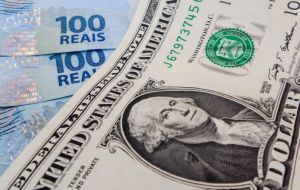MercoPress. South Atlantic News Agency
Latin American currencies softened against a strong US dollar following the Fed's two days meeting
 Brazil's real slid 1.2%. Data on Thursday showed growth in Brazilian manufacturing activity slowed in April to its weakest pace in six months
Brazil's real slid 1.2%. Data on Thursday showed growth in Brazilian manufacturing activity slowed in April to its weakest pace in six months Latin American currencies softened against a stronger U.S. dollar on Thursday, a day after the U.S. Federal Reserve kept interest rates steady, while most regional stock markets broadly fell along with their global peers.
Regional markets, returning from the Labour Day holiday, were also pressured by declining crude prices hurting energy stocks and currencies of oil exporters.
Fed Chair Jerome Powell on Wednesday signaled little appetite to adjust interest rates anytime soon. This disappointed some market participants who had hoped for a more dovish stance as it reduced the possibility of a rate cut in the near future, said Dan Kawa, a strategist at TAG Investimentos.
Brazil's real slid 1.2%. Data on Thursday showed growth in Brazilian manufacturing activity slowed in April to its weakest pace in six months. Stocks in Sao Paulo dropped 0.9%, weighed by losses across most sectors.
Prices of some local stocks adjusted for moves seen in their corresponding American depository receipts (ADR) on Wednesday, when equities in Sao Paulo did not trade due to a holiday for Labor Day.
Local shares of iron ore miner Vale SA fell 2.3%, following Wednesday's 3.1% slide in its ADR. State-run oil firm Petrobras saw its shares fall more than 1% amid a slide in oil prices and a 2% fall on Wednesday in Petrobras' ADRs.
Declining copper prices knocked the Chilean peso, down for the eight session in nine. The currency slipped half a percent to its lowest since late March on the day. Chile stocks fell to their lowest in four months.
Argentina's troubled peso softened, while stocks surged almost 4.2%, with all companies within the index in positive territory.
Emerging market countries need to expand their currency crisis fighting toolkits and be ready to embrace the kind of money printing tactics used in the U.S., Europe and Japan, the head of the Bank for International Settlements (BIS) said on Thursday.




Top Comments
Disclaimer & comment rules-

-

Read all comments#Enrique Massot
May 04th, 2019 - 05:18 pm 0REF: pneumonia
It's chronic in South Marica !
Look where this retarded is going [at the expenses of the public funds] to beg for a few farthings:
https://renovamidia.com.br/ernesto-araujo-viaja-a-europa-em-busca-de-mais-investimentos/
What else is new?
May 03rd, 2019 - 03:31 pm -1The U.S. sneezes, Latin America catches pneumonia.
Commenting for this story is now closed.
If you have a Facebook account, become a fan and comment on our Facebook Page!